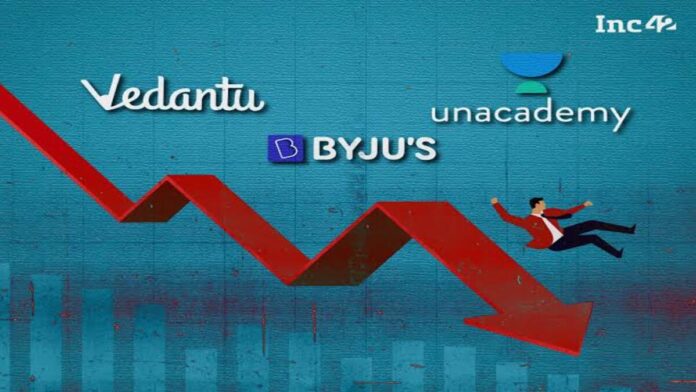The blue-eyed industry of investors and the saviour of millions of students, EdTech, is struggling right now.
Parents are outraged by several of these platforms, which were once thought to alter the educational system.
Parents are currently vehemently criticising these sites, their operations, and their effects on pupils.
According to a Local Circles poll, 81% of users of edtech platforms had experienced problems in the recent 24 months.
Byjus served as India’s edtech industry’s poster child, but the business has had problems for many years.
According to a recent Local Circles study, 32% of users have had problems with Byjus.
After the trial time, getting fee refunds has proven to be the biggest problem for clients, with a staggering 65 percent of respondents citing this as a major source of frustration.
35 percent of respondents complained about broken promises, issues with trust and transparency, and 62 percent had issues with changes in the teaching personnel and the quality of instruction.
Customers have complained about other platforms as well, such as Unacademy and Udemy, outside simply Byju’s.
As parents and individuals looked into opportunities for better learning and taking additional courses, many of which were given at cheaper prices compared to offline classes, online education or learning via technological platforms truly took off during the epidemic.
Parents have turned to the National Commission for the Protection of Children’s Rights (NCPCR) and other consumer forums to complain about a variety of fraudulent practises, such as overcharging for course fees, refusing to issue refunds following an unsatisfactory trial period, not offering any services, ineffective teachers, subpar course materials, etc.
The situation was so bad that the federal government issued a warning in January 2022 urging people to use caution while enrolling in online courses and to avoid clicking on the auto-debit tool provided by businesses.
It has also been reported that Dr. Subhas Sarkar, the Union Minister of State (MoS) for Education, said, “Do not trust the’success stories’ shared by the edtech companies without proper verification as they might be a trap to gather more audience.”
Several online education systems have emerged during the past few years. Nearly all platforms have laid off their staff, with the exception of few, like Lido Learning, who closed their doors after charging full fees for their courses.
There is a vast list of websites that have closed, including Udayy, Qin1, and Superlearn.
Following Human Rights Watch’s discovery of widespread abuses of children’s rights committed by governments around the world during the Covid-19 outbreak, some nations have taken action.
The NCPCR summoned Byju Raveendran in December 2022 amid claims that the platform had “indulged in malpractice,” according to the NCPCR.
According to reports, the Enforcement Directorate searched Byju’s affiliated properties in May 2023 due to alleged foreign exchange rule violations.
On June 23, the media reported that Deloitte, Byju’s auditor, and three directors of the company who represented some notable investors had resigned.
According to data research, venture capital for the edtech sector increased from USD 500 million in 2019 to USD 4.7 billion in 2020, with USD 1.9 billion going exclusively to Byjus. Startups started to appear in 2021, and four out of every ten companies formed that year were in the edtech industry.
The bubble eventually burst. According to Tracen statistics, the ecosystem for Indian edtech startups saw a decline in funding from USD 4.1 billion in 2021 to USD 2.5 billion in 2022.
The Ministry of Education stated plans to create regulations to control this industry in 2021 and the year after it became aware of the growing number of complaints over the predatory marketing and advertising strategies utilised by EdTech companies.
In response, the Indian EdTech Consortium (IEC), a self-regulatory organisation, was established by the Internet & Mobile Association of India (IAMAI).
Refunds and changes in teaching staff/effectiveness are the top problems experienced by users of online education platforms in the past two years, according to Local Circles’ analysis of survey data.
The majority of those polled said they had trouble getting fee refunds when the courses turned out to be below expectations, followed by 62 percent who had trouble with changes in the teaching staff’s effectiveness and 35 percent who had problems with broken promises, issues with trust, and transparency.
While many parents have concerns with Unacademy, Udemy, Physicswallah, and other platforms, 32% of respondents reported having problems with Byju’s.




